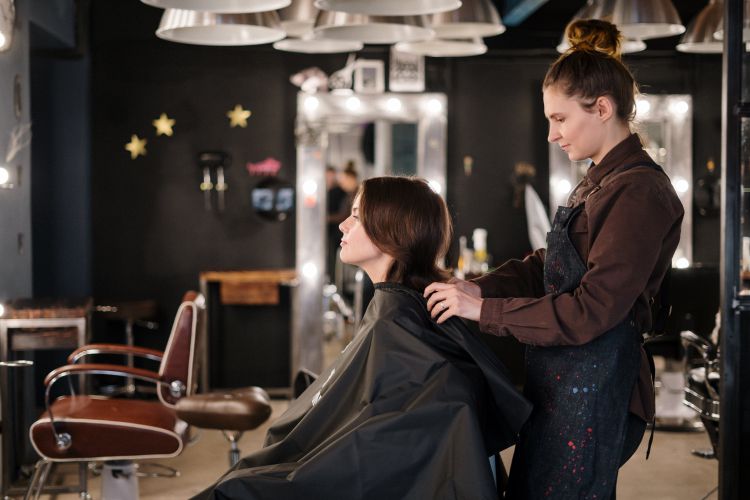 Salons are places of beauty and transformation, where professionals work tirelessly to enhance the appearance and confidence of their clients. However, the pursuit of beauty often conceals a less glamorous reality: the occupational risks faced by salon workers, particularly those handling hair straighteners.
Salons are places of beauty and transformation, where professionals work tirelessly to enhance the appearance and confidence of their clients. However, the pursuit of beauty often conceals a less glamorous reality: the occupational risks faced by salon workers, particularly those handling hair straighteners.
In the quest to create sleek and polished hairstyles, beauty professionals frequently encounter a range of chemicals present in these products. Some of these have been associated with adverse health effects, including potential carcinogenic risks.
This article discusses the occupational risks associated with hair straighteners, shedding light on the challenges faced by salon professionals.
Potential Carcinogens in Hair Straightening Products
The beauty industry’s reliance on chemical hair straightening products has raised alarm due to the potential health risks they pose. Specific chemicals, such as formaldehyde and related compounds, present in these products, have been classified as potential carcinogens.
Repeated exposure to these substances significantly elevates the risk of developing cancer.
A study conducted by the National Institutes of Health (NIH) sheds light on this issue. Involving 33,497 women aged 35-74 in the Sister Study, which aims to identify risk factors for various health conditions, researchers made a startling discovery.
The study revealed that women who frequently used hair straightening products were more than twice as likely to develop uterine cancer. The findings demonstrated a substantial increase in the risk of uterine cancer among frequent users, with the probability rising from 1.64% in non-users to 4.05%.
Legal Rights of Affected Salon Workers
Beauty professionals should be well-informed about their legal rights concerning occupational safety, particularly in the context of the risks linked to hair straightening chemicals. Understanding the available avenues for recourse is essential if they believe their health has been jeopardized due to prolonged exposure.
Legal actions, such as the hair straightener cancer lawsuit, have been initiated in different districts. It underscores the need to address the health concerns of salon workers and the importance of promptly reporting unsafe working conditions.
TorHoerman Law has reported numerous lawsuit claims against manufacturers, leading to the formation of multidistrict litigation (MDL). The Hair Relaxer MDL will be consolidated in the US District Court for the Northern District of Illinois, indicating the gravity of the issue.
Hair Straightening Brands Linked to Cancer
According to reports from Drugwatch, numerous hair straightener brands have faced litigation due to their products’ potential to increase the risk of severe health issues. They include well-known names like Dark and Lovely, L’Oreal, Motions, Just for Me, Soft & Beautiful, Olive Oil Girls, Optimum, and TCB Naturals.
Consumers have reported associations between these products and uterine cancer, breast cancer, ovarian cancer, and various other health complications. This revelation has prompted legal action against the manufacturers. Affected individuals seek accountability for the health risks posed by these hair straightening brands.
Regulatory Challenges in Governing the Use of Hair Straightening Products
The lack of rigorous regulations in the salon industry significantly jeopardizes the safety and welfare of salon workers. Oversight varies widely across different countries and regions, leading to inconsistencies in the protection provided to these professionals.
The recent proposal by the Food and Drug Administration (FDA) to ban hair-straightening products containing or emitting formaldehyde, is a noteworthy development.
According to The New York Times, this action comes more than a decade after experts within the industry expressed concerns about its hazardous nature. The fact that these products remained unregulated serves as a stark reminder of the deficiencies in ensuring the health and well-being of salon workers.
In the United States, the situation began to change when Congress granted the FDA oversight authority over cosmetics. While this newfound authority does not mean that all new products will undergo rigorous agency review, it is a step in the right direction.
Manufacturers are now required to register their sites with the FDA and disclose product ingredients. The FDA also has the power to issue mandatory recalls in cases of serious health concerns or fatalities.
Nevertheless, these developments underscore the urgent need for a comprehensive and uniform regulatory framework for hair straightening products. This includes stricter guidelines, ingredient transparency, and effective oversight to mitigate the risks associated with these products.
Protective Measures for Safeguarding the Health of Salon Workers
Protective measures are pivotal in safeguarding the health and well-being of salon workers who are consistently exposed to hair straightening chemicals. Among these essential safeguards are gloves, masks, and proper ventilation systems.
Gloves serve as a frontline defense, reducing direct skin contact with potentially harmful substances. They act as a barrier against skin irritations and allergic reactions that can result from prolonged contact.
Masks, on the other hand, provide a critical shield against the inhalation of toxic fumes and chemical particles. Beauty professionals, when equipped with appropriate masks, are less likely to breathe in harmful airborne substances. This not only protects their respiratory health but also minimizes the risk of developing respiratory issues.
Proper ventilation systems are equally indispensable. They ensure that noxious fumes are effectively removed from the salon environment, reducing the risk of inhalation and providing a healthier workspace. Adequate ventilation significantly decreases the concentration of harmful chemicals in the air, making it a fundamental protective measure.
Conclusion
This article serves as a call to action. It urges stakeholders to work collectively to ensure that the occupational risks faced by salon workers are addressed.
The risks faced by salon professionals due to hair straightening products cast a shadow over the beauty industry. The presence of potential carcinogens, the lack of comprehensive regulations, and the pressing need for protective measures emphasize the urgent need for change.
The industry and regulatory bodies must prioritize the safety and well-being of these dedicated professionals who bring beauty to countless clients.











